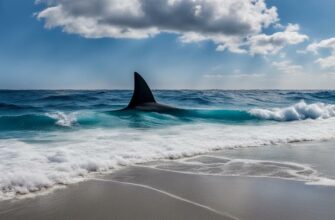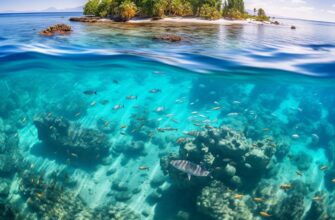Sharks are known for their fearsome reputation as apex predators in the ocean. However, many people are curious about whether they prey on sea turtles. In this article, we’ll explore the relationship between sharks and sea turtles, including their diets, behavior, and the role sea turtles play in the ocean ecosystem. Keep reading to learn more!
Firstly, let’s take a closer look at shark diets. While they are known to be opportunistic feeders, sharks generally prefer a diet that consists of fish, squid, and crustaceans. They have also been known to eat other marine mammals, such as seals and sea lions. But do they specifically target sea turtles as a food source? We’ll find out in the next section.
- Understanding Shark Diets
- Are Sea Turtles Part of a Shark’s Diet?
- How Sharks Hunt Sea Turtles
- Conclusion
- The Role of Sea Turtles in Shark Ecosystems
- Sea Turtles and Shark Populations
- Do Sharks Specifically Target Sea Turtles?
- Conservation Efforts to Protect Sea Turtles from Shark Predation
- Research and Education
- FAQ: Common Questions about Sharks and Sea Turtles
- Q: Do any species of sea turtles have natural defenses against shark predation?
- Q: Can sea turtles defend themselves against shark attacks?
Understanding Shark Diets
Sharks are known for their diverse and adaptable feeding habits. They are opportunistic predators and will consume a wide range of prey, from small fish to marine mammals. Some species are specialized feeders, while others have a more generalist diet.
Shark diets can vary depending on their habitat, behavior, and the availability of prey. Some sharks are found in deep water and feed primarily on squid and fish, while others live in coral reefs and consume small crustaceans and invertebrates.
Some common prey items for sharks include bony fish, rays, and smaller sharks. They are also known to feed on seabirds, sea turtles, and even carrion.
Are Sea Turtles Part of a Shark’s Diet?
Sharks are one of the ocean’s top predators and have a diverse diet that includes fish, squid, and even other sharks. However, their reputation as fierce hunters has led many people to wonder if they also prey on sea turtles.
The answer is yes, sharks do eat sea turtles, but it is not a common occurrence. Sea turtles are not typically a preferred food item for most shark species, and they are not often specifically targeted by sharks. Instead, shark attacks on sea turtles are usually opportunistic and occur when a turtle happens to cross paths with a hungry shark.
| Types of Sharks that Eat Sea Turtles | Sea Turtle Species Most at Risk |
|---|---|
| Tiger Sharks | Green Sea Turtles |
| Bull Sharks | Hawksbill Sea Turtles |
| Great White Sharks | Loggerhead Sea Turtles |
Studies have shown that tiger sharks are the most likely to feed on sea turtles, with green sea turtles being the preferred species. Bull sharks and great white sharks have also been known to attack sea turtles, but their occurrence is less common.
It is important to note that while sharks may occasionally prey on sea turtles, they are not the primary threat to their populations. Human activities such as coastal development, pollution, and overfishing have a much greater impact on sea turtle populations worldwide.
“While sharks may occasionally prey on sea turtles, they are not the primary threat to their populations.”
How Sharks Hunt Sea Turtles
When sharks do target sea turtles, they typically do so by ambushing them from below. Sharks have a keen sense of smell and can detect the chemicals released by sea turtles, making it easier for them to track down their prey.
Once a shark has located a sea turtle, they will move in for the kill, biting down on the turtle’s shell and using their powerful jaws to crush it. Despite the strength of a sea turtle’s shell, it is not enough to protect them from the force of a shark’s bite.
Conclusion
While sharks do occasionally eat sea turtles, it is not a common occurrence. Sharks are opportunistic hunters and are more likely to prey on fish or squid than sea turtles. Additionally, human activities have a much greater impact on sea turtle populations worldwide than shark predation. It is important to continue conservation efforts aimed at protecting sea turtles and preserving their populations.
The Role of Sea Turtles in Shark Ecosystems
Sea turtles play an important role in maintaining healthy marine ecosystems, and as such, their interactions with sharks are an important aspect of ocean biodiversity.
Sea turtles can act as a food source for sharks, particularly in their juvenile stages where they are more vulnerable to predation. However, sharks do not rely solely on sea turtles for sustenance, and their diets are typically diverse, encompassing a variety of fish, rays, and other marine animals.
Additionally, sea turtles also contribute to the ecosystem by feeding on seagrass, which helps to maintain the health of seagrass beds and protect against erosion. They also transport nutrients and provide habitat for various marine organisms, including fish and crustaceans.
Sea Turtles and Shark Populations
While sea turtles may occasionally fall prey to shark predation, their populations are not threatened solely by sharks. Human activities, such as coastal development and marine pollution, have had a much more significant impact on sea turtle populations.
Furthermore, sea turtles serve as an important food source for several shark species, so their preservation is critical for maintaining healthy shark populations as well. Efforts to protect sea turtles from predation should therefore be balanced with conservation efforts aimed at preserving both shark and sea turtle populations.
Do Sharks Specifically Target Sea Turtles?
While it is known that sharks do occasionally prey on sea turtles, the question of whether they specifically target them is still up for debate. Some researchers believe that sharks are opportunistic predators, meaning they will take advantage of any food source that presents itself, including sea turtles. Others suggest that sea turtles may be a more deliberate target for some shark species.
One study found that tiger sharks, a species known to consume sea turtles, actively seek out areas where turtles are abundant, suggesting that they may be specifically targeting them. However, other studies have found that many shark attacks on sea turtles occur by chance, as the turtles are simply in the wrong place at the wrong time.
It’s worth noting that while sea turtles may not be a primary food source for most shark species, their consumption can still have a significant impact on turtle populations. With many sea turtle species already facing threats from habitat loss, pollution, and other factors, even occasional predation by sharks can exacerbate their decline.
Conservation Efforts to Protect Sea Turtles from Shark Predation
As sea turtle populations continue to decline due to a variety of factors, including habitat loss and overfishing, it is imperative that conservation efforts are put in place to protect these vulnerable creatures from predation by sharks.
One approach being taken is the use of exclusion devices, such as shark nets and drumlines, which are designed to create physical barriers between sharks and sea turtles in high-risk areas. While these methods have been effective in reducing the number of sea turtle fatalities, they can also have unintended consequences, such as unintentionally trapping other marine animals or altering the natural behavior of sharks.
Another method being used is the implementation of marine protected areas, which restrict certain activities, such as fishing and boating, in designated areas to preserve the habitats of sea turtles and other marine animals. These protected areas not only benefit sea turtles, but also the overall health of the ecosystem and the sharks that inhabit it.
Research and Education
Research is also being conducted to better understand the interactions between sharks and sea turtles and to develop more effective conservation strategies. By studying the behavior and feeding habits of sharks, researchers hope to gain insight into the factors that influence shark predation on sea turtles and to develop methods for reducing these interactions.
Education and outreach efforts are also crucial in promoting conservation efforts for sea turtles. By educating the public on the importance of sea turtles in the ecosystem and the threats they face, individuals are empowered to take action and make a positive impact on the health of marine environments.
In conclusion, it is clear that protecting sea turtles from predation by sharks requires a multi-faceted approach that involves research, education, and conservation efforts. By working together, we can ensure the survival of these incredible animals for generations to come.
FAQ: Common Questions about Sharks and Sea Turtles
Q: Do sharks purposefully hunt sea turtles?
A: While sharks have been known to prey on sea turtles, they do not specifically hunt them. Sharks are opportunistic feeders and will target any available prey that they can catch, depending on their location and diet preferences. Sea turtles are simply one of many potential food sources for sharks.
Q: Which species of sharks are known to eat sea turtles?
A: Many shark species have been documented feeding on sea turtles, including great white sharks, tiger sharks, and bull sharks. However, the frequency of these incidents varies depending on the species and location.
Q: Are sea turtles a vital part of the shark ecosystem?
A: Yes, sea turtles are an important part of the marine food chain and provide a key food source for many predators, including sharks. Additionally, sea turtles help maintain healthy seagrass and coral reef ecosystems, which are essential breeding and feeding grounds for a variety of marine species.
Q: Do any species of sea turtles have natural defenses against shark predation?
A: Yes, some sea turtles have developed natural defenses against shark attacks. For example, the hawksbill sea turtle’s shell is particularly hard and jagged, making it difficult for sharks to bite into. Additionally, some sea turtle species are known to flail their flippers and use their sharp claws to defend themselves against predators.
Q: What conservation efforts are in place to protect sea turtles from shark predation?
A: Many conservation organizations are working to protect sea turtle populations from shark predation. In some areas, conservationists have established marine protected areas where hunting and fishing are prohibited, allowing sea turtle populations to recover. Researchers are also studying the effectiveness of shark repellents and deterrents in reducing the number of shark attacks on sea turtles.
Q: Can sea turtles defend themselves against shark attacks?
A: While sea turtles do not have any specific defense mechanisms against shark attacks, they have been known to use their flippers and sharp claws to fend off predators. Additionally, some species of sea turtles can hold their breath for up to six hours, giving them time to swim away from potential predators.









